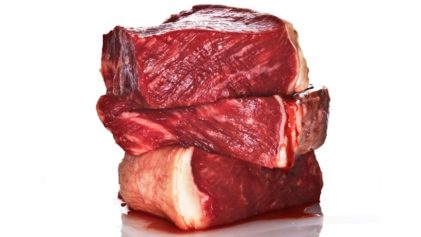Most of the time we tell you to eat everything in moderation, but there are just some foods even the experts stay away from. Ironically, deep-fried candy bars didn’t make the list — we polled both the Healthy Eats staff and nationwide nutrition experts to see which foods they shy away from.
From Our Experts:
We polled our very own Healthy Eats experts and found some interesting foods they steer clear of:
Bottled Salad Dressing
“They are loaded with preservatives and are a source of added sugar that most people don’t realize. It’s so easy (and tastes so much better) when you make your own .”
– Dana White
Raw Fish
“I avoid raw fish (i.e. sushi) as there’s just too high of a risk for getting sick from various pathogens. Between all the food safety information that’s saturating my brain, it just scares me.”
– Toby Amidor
Genetically Modified Foods
“I avoid GMOs because of the risk for adverse health effects and to support small local farmers that are producing quality products free of hormones, antibiotics, pesticides and GMOs.”
– Katie Cavuto Boyle
Gum with “Layers”
“When I first chewed this new gum with layers, I loved the bursting fruity flavor. But after reading the ingredient list, I’ll never chew this gum, which contains gelatin (animal-based) and partially hydrogenated coconut oil (trans fat) – again. While both ingredients are so small they’re virtually insignificant, I don’t think they need to be in gum, so I will never chew it again!”
– Janel Ovrut
National Experts:
Many of the experts we asked had a tough time coming up with a response, because many don’t want to be told they’re the “food police.” But once they took some time to think about it, their answers made a lot of sense. Check out these ten foods they came up with.
Raw Sprouts
“Although, I love the fresh, crisp taste of raw alfafa sprouts, I avoid eating them because of outbreaks of E. coli infections associated with them. With only about 10 calories per cup and a good dose of vitamin K, folic acid and cholesterol-reducing compounds called saponins, these tiny sprouts are a good-for-you food. However, I choose to steer clear of them by substituting sliced cukes, diced carrots and julienned basil leaves in my salads, sandwiches and soups.”
– Victoria Shanta Retelny, a registered dietitian and owner of a nutrition & culinary communications consulting practice, LivingWell Communications, in Chicago.
High-Mercury Fish
“My husband loves swordfish, but I rarely buy it for him because of the high mercury content. I prefer to serve smaller fish which are lower in mercury to my family, like shrimp, scallops, tilapia and salmon.”
– Keri Gans, MS, RD, CDN, Spokesperson, American Dietetic Association
Fake Foods
“I steer clear of foods the glow in the dark or smell like something that you’d never find in nature. My food philosophy is that the further we stray from real ingredients from the earth, the less healthful the food will be for us — and the more problems it will ultimately create for our Earth. Artificially neon-colored soft drink powder packets are definitely too oddly unnatural and heavily processed to ever be found in my shopping basket. Though I like to consider myself a food lover, not hater, my basic bottom line is ‘If you don’t need it, why eat it?‘”
– Jackie Newgent, RD, recreational culinary instructor at the Institute of Culinary Education and author of Big Green Cookbook (Wiley, 2009).
Conventionally Raised Meat and Poultry
“Although our diet has a plant emphasis. when I purchase meat and poultry for my family, it’s always grass-fed and organic. I’ve been concerned about antibiotic resistance for two decades. With superbugs like MRSA invading our beaches, we want to make sure there are antibiotics that work against these bugs for our children and their next generation.”
– Melissa Halas-Liang, MA RD CDE, founder of www.superkidsnutrition.com
Brains
“I can only think of a couple of foods I’d rather not eat. The main one is brains. I just don’t like the idea of eating them, but concern about prion diseases (remember mad cow?) provides a convenient excuse.”
—Marion Nestle, professor of nutrition, food studies, and public Health at NYU and author of Food Politics and What to Eat.
Products That Claim Too Much
I recommend my clients stay away from sports nutrition products that promise unbelievable results…
—Nancy Clark, author of Nancy Clark’s Sports Nutrition Guidebook and sports dietitian in the Boston-area
Artificial Sweeteners
“I avoid all foods with artificial sweeteners. I do not feed any foods with artificial sweeteners to my kids, and I also tell my clients to slash it out of their diet. First, I believe in fueling your body with real foods instead of chemicals, and also know there is mounting research suggesting artificial sweeteners can’t fool your brain and actually lead to sugar cravings, which is definitely not a good thing!”
—Mitzi Dulan, RD, CSSD, Co-Author of The All-Pro Diet
Well-Done Meat and Fish
“I avoid charred chicken or fish cooked to well-done at the barbecue. Although I love the flavor of the protein that’s become blackened or that is well-done, I don’t want to ingest the carcinogens, known as heterocyclic amines (HCAs) that form when the meats are cooked at a high temperature. So I stick to eating meats that are roasted or baked since the temperature isn’t as high and the dangerous carcinogens aren’t formed.”
—Lyssie, Lakatos, RD, CDN, CFT, one of The Nutrition Twins and co-author of The Secret To Skinny
Non-Safe Plastics
“I do not microwave food in plastic, so I am careful to transfer foods to glass bowls, and check the number on the bottom of any plastics that we use in the kitchen, especially the kids plates and bowls.”
—Elizabeth DeRobertis, MS, RD, CDN, CDE, Director of Nutrition Programs at Scarsdale Medical Group, New York and Founder of Westchester Nutrition Consultants.
Farm-Raised Fish
“I feel strongly about purchasing and eating wild salmon as opposed to farm raised salmon. When I learned that fish “farmers” could select the color of their feed to match the color they wanted their salmon meat to most resemble, I was shocked. Eating wild caught Alaskan salmon may be a bit more expensive, but the in the long run, it provides more Vitamin D, less contaminates, less PCBs and a kinder environment for the fish. Cooking with high quality, natural ingredients also means a better-tasting meal, which results in a satisfied eater.”
Source: Toby Amidor, Food Network

